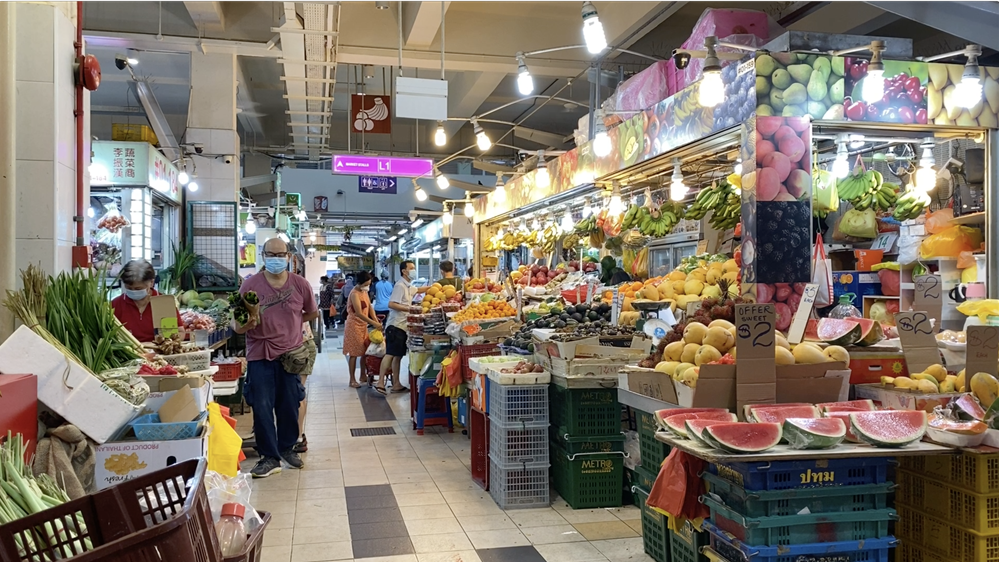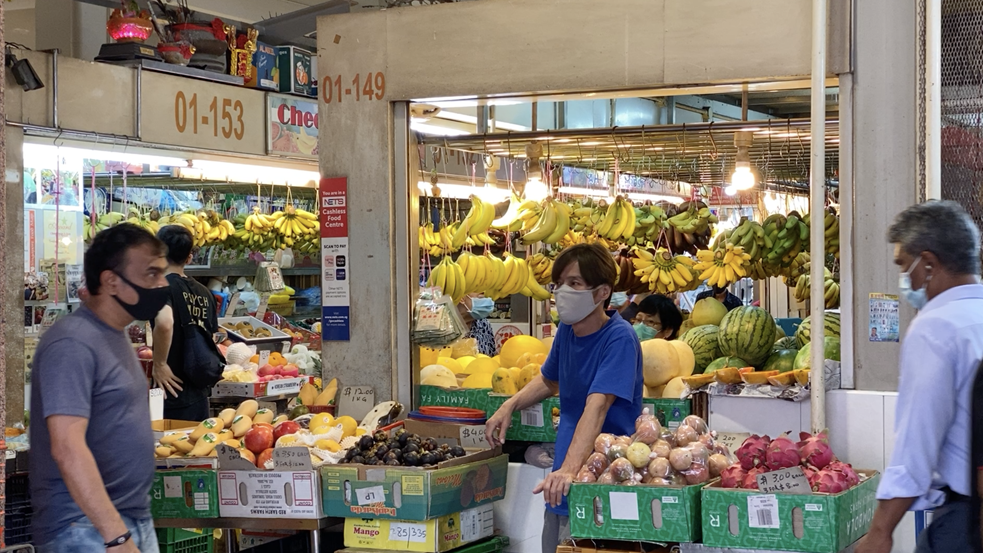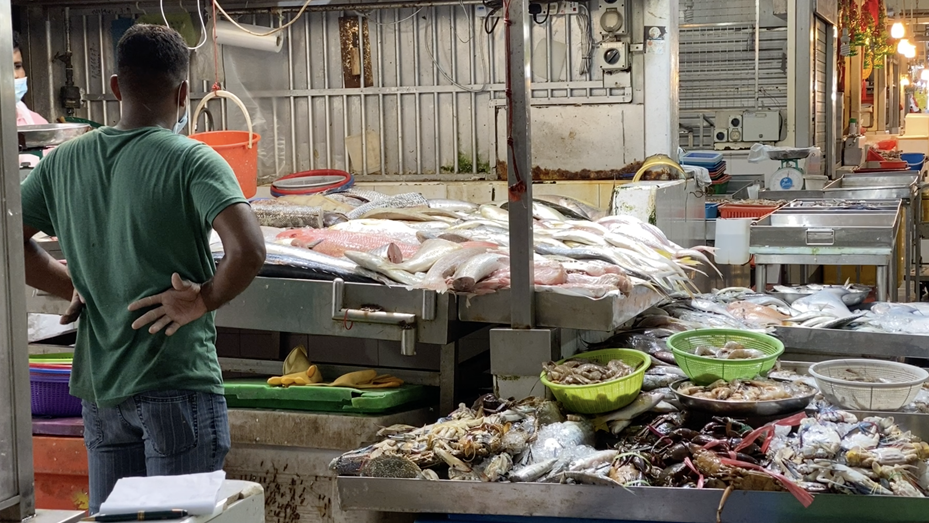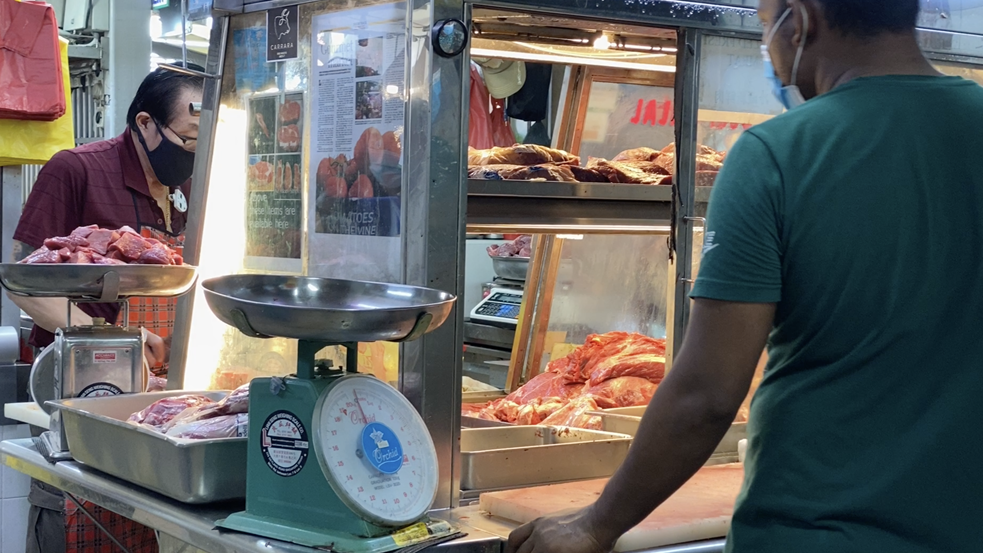
A wet market in Singapore. /CGTN
A wet market in Singapore. /CGTN
Wet markets are often in the headlines these days, condemned as "medieval" or "unhygienic" in the West. But in many parts of Asia, wet markets are an essential part of people's lives – even in First World city-state Singapore. During the COVID-19 pandemic, some vendors on the island nation have found a way to virtually replicate the wet market shopping experience in the comfort of their customers' homes.
The hustle and bustle of wet markets, bursting with fresh, tasty produce, are a familiar sight and sound to many Singaporeans. Part of the nation's cultural heritage and identity, wet markets act as a hub of the community and meeting point for the older generations. However, during the coronavirus pandemic, they could quickly become the center of new case clusters. Singapore entered its current "Circuit Breaker" period, or partial lockdown, at the beginning of April, with people being advised to only go out to do essential things and the elderly being told to minimize physical interactions.

Singaporeans have been advised to avoid crowded marketplaces. /CGTN
Singaporeans have been advised to avoid crowded marketplaces. /CGTN
Singapore's Prime Minister, Lee Hsien Loong, recognized wet markets' potentially unsafe nature during his first speech to announce the circuit breaker measures. "In places like hawker centers and wet markets, it is difficult to practice safe-distancing, especially on the weekends when it is crowded. It will help if we all adjust our habits. For example, do our marketing on weekdays instead of weekends to avoid the crowd", he said.
A quintessential part of Singaporean life, wet markets are frequented by locals and visitors to the city-state alike. "Wet markets started back in the 1960s, so we call it a wet market and hawker integrated. You know, Singapore is famous for hawker centers and there are also markets that sell daily groceries like fish, pork and meat and vegetables and fruits, so it is like an integration of our livelihood for most Singaporeans. It has become our heritage or culture, you know, an everyday part of life", said Victor Chia, stall owner of Chia's Vegetables Supply at Tekka Wet Market.

Tekka Wet Market is the largest wet market of its kind in Singapore. /CGTN
Tekka Wet Market is the largest wet market of its kind in Singapore. /CGTN
Although Singapore's largest wet market, Tekka Wet Market, in the Little India district has remained open as an essential service, stall owners noticed an immediate impact on demand and a decreased footfall, with customers worried about catching the virus at busy, crowded markets.
"With the coronavirus' arrival in Singapore, actually at the end of January, I started going to the wet market a bit less regularly. I still went there in February and in early March, but then I decided that because there are a lot of people in the wet market, it is less easy to control the flow of people entering. Also, the alleys between the stalls are quite small so you are quite tight and I didn't feel very safe", said Singapore resident and regular Tekka Wet Market customer, Héloïse de Montgolfier.
De Montgolfier also claims that she has been hesitant to shop at the Tekka Wet Market as it is far from her home, and she has been worried about using public transport during the circuit breaker period. "Since the official start of the circuit breaker, I still haven't been there and it has really changed my habits. Now, I have to go to the supermarkets, or order online, but I feel like I don't have access to the same good products that I had access to before", she said.
In order to continue sales, and to keep buyers and sellers safe during this period, Singapore's Infocomm Media Development Authority collaborated with a group of stall owners at Tekka Wet Market to bring the wet market shopping experience directly to people's homes, using Facebook Live. Going digital has allowed stall owners to continue serving their customers who no longer feel safe attending the market in person, and reach customers in different localities, thanks to free island-wide delivery.

Buyers and sellers in a wet market. /CGTN
Buyers and sellers in a wet market. /CGTN
"I have recently come to know that Tekka Center sellers have started to sell online on Facebook Live. I haven't tried yet, but this is definitely something I'm willing to try, especially for all the products I can't find elsewhere", said de Montgolfier.
With the strict measures on the movement of people set to continue for weeks to come in Singapore, as the country looks to lower new coronavirus case numbers, more wet market stall owners could be keen to jump on the socially distanced, virtual shopping bandwagon.
Chia was one of the first stall owners at the Tekka Wet Market to adopt the new, digital initiative and start selling his vegetables on Tekka Online Market's Facebook page. "People are more used to staying in right now and have the privilege to order groceries online. I guess it is the way to go and this is something I will look into, how to expand my business, how to get new avenues of customers in the future", said Chia.
Although the coronavirus outbreak in the city-state has put a dampener on visitors to physical wet markets, as Singaporeans stay at home, grocery sellers have never had a better opportunity, or more captive audience, to sell their wares.